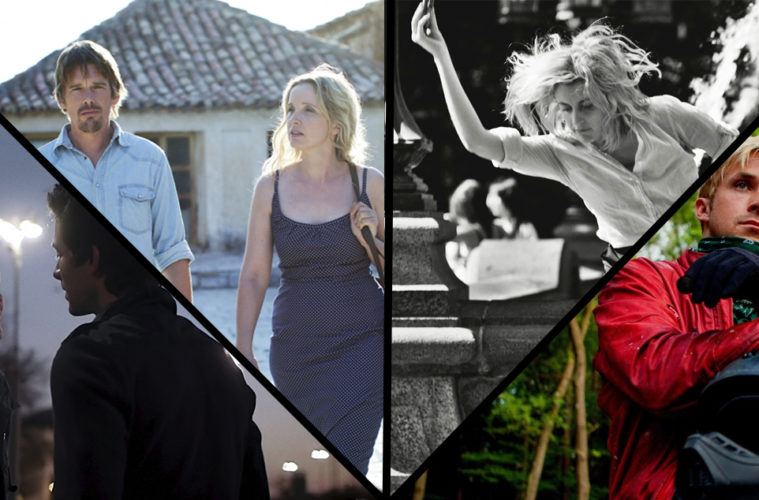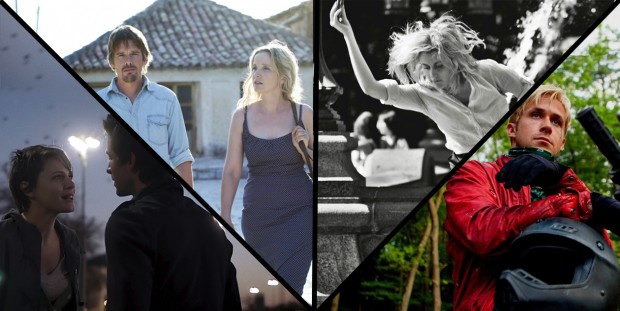If this Labor Day weekend goes smoothly, we’ll have made it through the bloated summer movie season relatively unscathed. To celebrate, we’ve selected our favorite films of the year thus far, from January to August 2013. One can think of this as a summer wrap-up, too, although the fact that only one studio release from the season made its way in should indicate our thoughts on Hollywood’s offerings.
While the end of this year will bring our personal favorites, think of the below 25 films as a comprehensive rundown for what should be seen before heading into the promising fall line-up. As a note, this feature is based solely on U.S. theatrical releases in 2013 and many are widely available on home video, streaming platforms, or theatrically, so check them out below in alphabetical order and return next week for our multiple fall preview pieces.
Honorable mentions: At Any Price, Fruitvale Station, Hannah Arendt, Mud, No, Only God Forgives, Pain & Gain, Prince Avalanche, Sightseers, Stoker
The Act of Killing (Joshua Oppenheimer)
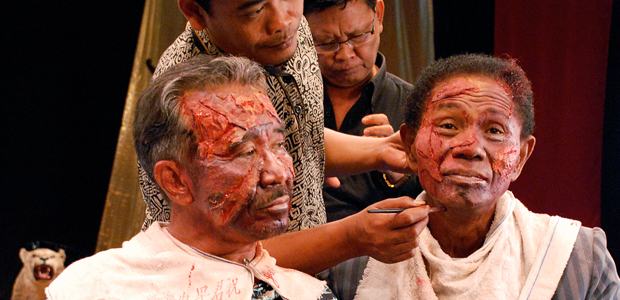
While Hollywood attempts to conjure the latest harrowing characters and situations in their offerings, one documentary this summer proves that nothing can beat the real thing, for Joshua Oppenheimer‘s document of real-life Indonesian serial killers is perhaps the most unforgettable experience one can have at the cinema this year. It’s a true testament to not only the film’s structure, but the bond our director created with these men that, without it, this — especially a devastating third act — could have easily been a superficial look at the events. Instead, its matter-of-fact nature will get under one’s skin and never let go. – Jordan R.
Ain’t Them Bodies Saints (David Lowery)
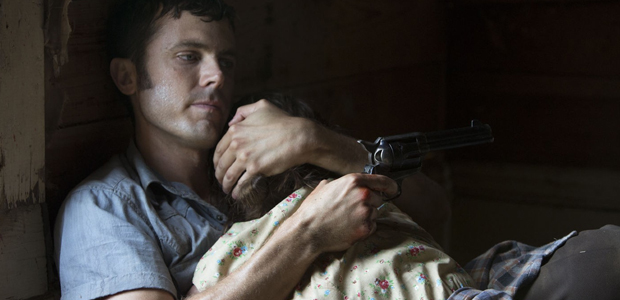
If Bonnie and Clyde survived their final stand-off and attempted to live a life after crime, we would have the basic set-up of writer-director David Lowery‘s subdued, deeply felt Ain’t Them Bodies Saints. But that is just the beginning, as the Casey Affleck– and Rooney Mara-led drama skirts around the major peaks one may find in another film of its kind, instead focusing on the quiet, sublime exchanges. After a handful of low-budget features, Saints marks a bona fide break-out for Lowery, a filmmaker who cares as much about the world he creates as the people that inhabit it. The characters of this tragic small-town drama must learn to live with their mistakes and, despite how ill-advised their decisions may be, each step remains as enthralling as the last. – Jordan R.
Before Midnight (Richard Linklater)
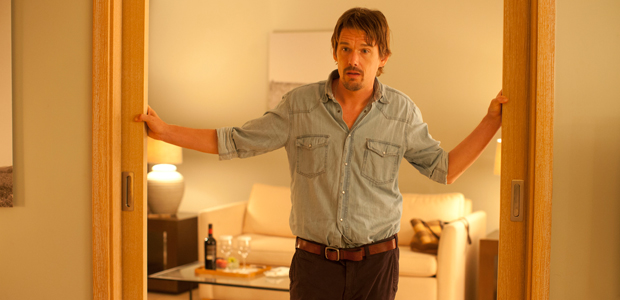
The first two entries of the Before series offered the comfort of watching two people escape through each other; trading words of their anxieties, lost loves and general uncertainties of adulthood, making those both young and old nod their heads in some kind of agreement. Yet, with the third, that’s undeniably altered, as Céline and Jesse have now (spoiler alert) been together for nine years; their relationship now a circular movement of the same arguments and erotic tricks that, essentially, are what cynically leads to marriage being seen as just routine. But chalk it up to the Linklater–Hawke–Delpy trifecta to make this funny, gorgeous, and, even despite an arguably “ironic” happy ending, at least somewhat hopeful about love, no matter how tough it all may be. – Ethan V.
Blackfish (Gabriela Cowperthwaite)
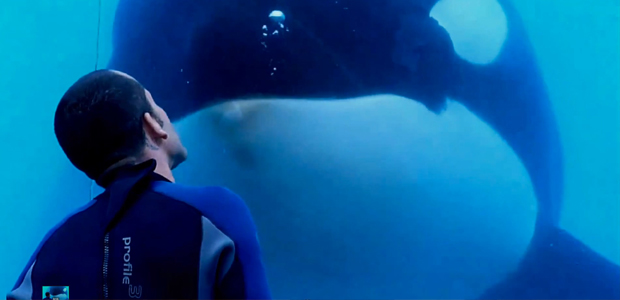
A powerful documentary going behind the scenes to expose the truth about SeaWorld’s dirty little secret, Gabriela Cowperthwaite’s Blackfish shows the consequence of hubristic action. Centered on the death of Orca trainer Dawn Brancheau, the film delves all the way back to the 70s to explain the extensive history of whale captivity and its horrific conditions leading to Tilikum earning the name Killer Whale. Everyone interviewed has extensive first-hand knowledge of the industry and/or Tilikum himself to paint a picture of just how dangerous mankind’s ego can become when bottom-line is king and the people in its control are too young and naive to realize what’s happening. One of the scariest films of the year, we’re shown the tragic result of our yearning to control nature. – Jared M.
The Bling Ring (Sofia Coppola)

Arriving after her most abstract work, Somewhere, Sofia Coppola’s The Bling Ring is a darkly comedic send-up of reality TV and the culture of Twitter (which creates the illusion you can be BFFs with Paris Hilton or Lindsay Lohan). Starring Emma Watson as the ringleader’s co-hort and Leslie Mann as her mom (who eggs them on with “vision boards”), The Bling Ring perfectly captures (to a literal extent, figuring in the late Harris Savides‘ gorgeous, final work) an American subculture gone too far. – John F.
Blue Jasmine (Woody Allen)
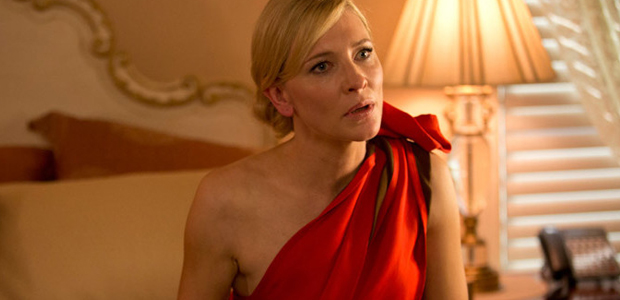
Blue Jasmine is centered around what could be the finest lead performance in a Woody Allen film, and indeed, Cate Blanchett dominates. But it is also Allen’s most nuanced — and best — drama since 1989’s Crimes and Misdemeanors. Thematically surprising, well-acted across the board (even Andrew Dice Clay is note-perfect), beautifully shot by Javier Aguirresarobe, and darkly funny (see: Michael Stuhlbarg’s creep dentist), Jasmine is one of the director’s most emotionally involving films. And while it always sounds and feels like Woody, this is Blanchett’s show. It is hard to think of an actress who could make a character so cluelessly detestable into a figure of vulnerability and heartache. As Allen memorably put it, “You hire her and get out of the way.” The result? A complex, unforgettable heroine, and a 2013 masterpiece. – Christopher S.
Computer Chess (Andrew Bujalski)
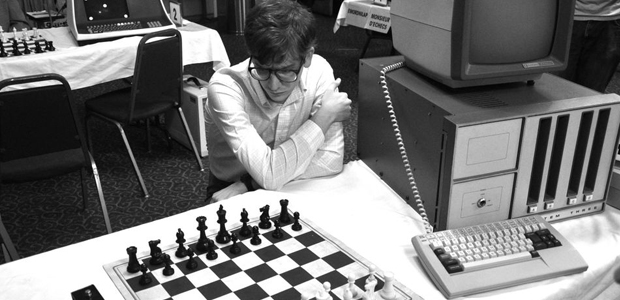
A faux documentary set at a man versus chess computer tournament, Andrew Bujalski returns with a completely original and often hilarious comedy. Shot on vintage Sony AVC-3260 black and white video cameras, this comedy explores various team members and officials who regulate the tournament including my favorite, Papageorge (Myles Paige), who gives one of the funniest deadpan performances of the year. – John F.
Frances Ha (Noah Baumbach)
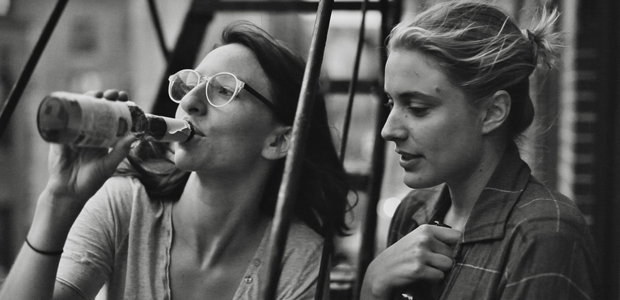
Mild, existing vestiges of its star’s “mumblecore” origins and its director’s acidic social preening are ultimately rejected in Frances Ha, a film that shows itself to have more kinship with the likes of Woody Allen’s Manhattan. (The black and white cinematography set amidst New York City being a bracingly obvious touchstone.) In its spirit, an alternately loose-limbed and tight-wired current runs through the Noah Baumbach–Greta Gerwig picture, thanks to an inextricable bond between image, script, and performance: the camera casts a patient glance on people in apartments, subways, bars, and restaurants, capturing the casual doling out of personal revelations which, set over a brisk 80-or-so minutes, accumulate into the portrait of human beings that is often painful but, somehow, always an undiluted pleasure. – Nick N.
The Great Gatsby (Baz Luhrmann)
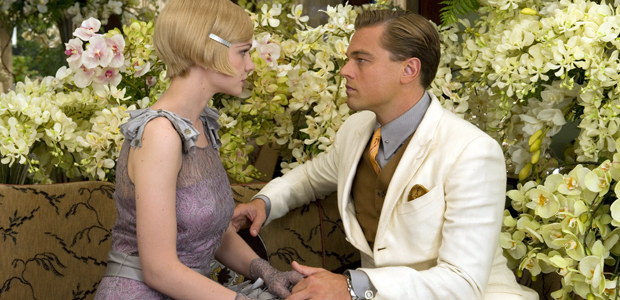
Claims that Baz Luhrmann had failed to “properly adapt” F. Scott Fitzgerald become strangely moot once you settle into the director’s own Great Gatsby, its peculiarities not supplanting the core of a classic text but, rather, breeding the past and present in order to create a result successfully familiar and inventive. For as classic a novel as we may be considering, a fidelity — appreciated though it is — proves to be of generally lesser interest when Luhrmann jumps through: the colorful, pop-at-you 3D photography brings to life an operatic period, while the more contemporary sensibilities — its finely assembled soundtrack a key example — draw us closer to 1920s New York than an outright traditional adaptation could ever hope to. Backed by a truly proper casting — while Leonardo DiCaprio is almost too easy a choice for the titular millionaire, that doesn’t render his performance any less magnetic — The Great Gatsby is among the most significantly accomplished films released by a studio in 2013. – Nick N.
The Hunt (Thomas Vinterberg)
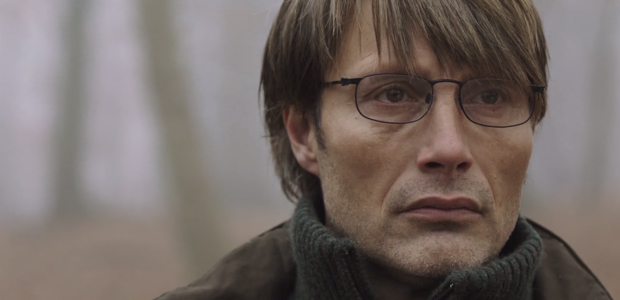
Although he’s got more than a few intriguing films to his name, Thomas Vinterberg’s The Hunt is a revelation, a textured artwork with everything in proper measure. The story is simple yet poignant, telling the moving tale of Lucas, a Danish schoolteacher whose community and friends turn against him due to a child’s obviously manufactured accusation. This subject matter often lends itself to detached, icy sermonizing or flat, matter-of-fact tv movie dramatics, but Vinterberg and his star Mads Mikkelsen navigate the pitfalls and deliver a film that is both moving and often deep in its sincerity. While Mikkelsen’s performance is one of the year’s best, he’s matched in excellence by every other aspect of the production. A masterful exploration of how concepts of social “truth” shape our relationships, The Hunt is the most affecting film I’ve seen this year. – Nathan B.
Inch’Allah (Anaïs Barbeau-Lavalette)
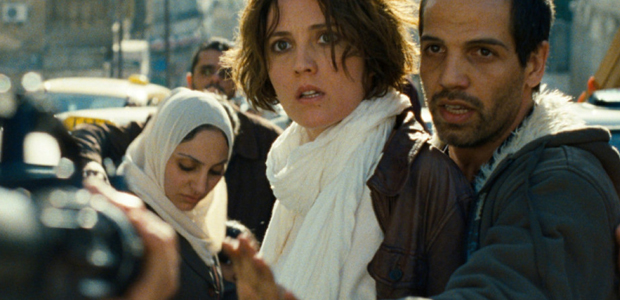
You can only get pushed so far before breaking; it’s what you do to put yourself back together that’s significant. This is the message I got from Anaïs Barbeau-Lavalette’s look at the Israeli/Palestinian conflict through the eyes of a naively idealistic doctor attempting to coexist in both worlds. Inch’Allah shows how guilt, regret, and sorrow can change the very make-up of our character as rationality gets thrown out the window once we’ve experienced a deeply emotional connection to the tragedy at hand. Barbeau-Lavalette fearlessly puts a face to the horrors in the Middle East and shows how heavy the stakes truly are. We can pontificate all day from America about which side is right or how a solution can be found, but this tale shows us the crippling sense of helplessness felt on the frontlines. – Jared M.
Leviathan (Lucien Castaing-Taylor and Verena Paravel)

A thought seems to run throughout Leviathan: “Why does this exist?” For all the impressive fish-gutting, water-bobbing GoPro cameras and incomprehensible fishermen mumbling, it seems to a degree difficult to decipher its “point” so to speak. Yet in its frequent spatial disorientation, taking us more than often too close for comfort, to the point that we’re never really observing (except for in the instance of one sleepy fisherman), but rather smashed against its subject, some kind of new visual language seems to be found, or rather searched for. Overall, it’s a film that’s abrasive musicality is, if not punk rock, then — maybe more appropriately with its clanging chains — heavy metal. – Ethan V.
Like Someone In Love (Abbas Kiarostami)
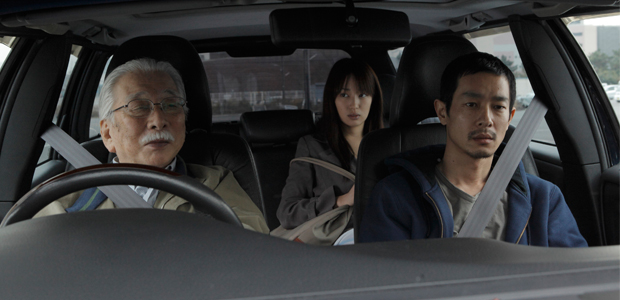
A slippery, enigmatic work, even by the standards of Abbas Kiarostami, Like Someone in Love is hardly designed to have the thrilling unspool effect of his better-known works — its spiritual predecessor, Certified Copy, being the most recent example. Instead, the Iranian legend, making his first trip to Japan, imbues a surface-level drama with deep-rooted concerns regarding interaction, commerce, and, yes, love that resonate in the viewer’s mind for weeks and months to come. In so many words, this writer’s positive (but not ecstatic) reaction from last February shouldn’t impede the current placement; I suspect the film might be too good to warrant a single-viewing judgement. – Nick N.
The Place Beyond the Pines (Derek Cianfrance)

One of the main criticisms of Derek Cianfrance’s sprawling Blue Valentine follow-up is that the director bites off more than he can chew. But when a multi-generational crime saga is this memorable, why should ambition be seen as a negative? Cianfrance has created visual and aural feast, from the memorable extended opening of Ryan Gosling’s daredevil heading to his motorcycle to his “Dancing in the Dark” post-robbery shuffle and an eerie climax among — where else? — the pines. When it’s all over, this Schenectady-set monster has demonstrated the reverberations a few random acts can cause for decades to come, the damage that can be wrought by absent parents, and the cool factor of peroxide-blond hair. Find another 2013 release that accomplishes all of that. – Christopher S.
Room 237 (Rodney Ascher)
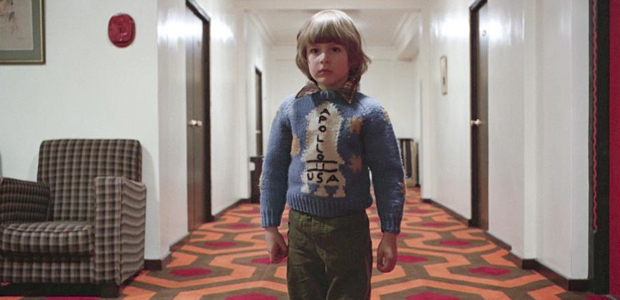
It’s neither an exhibition of criticism nor the reveal of some “shocking truth” behind a classic — but, at its heart, a touching story of cinephilia. That one word, for all the broadness it entails, is the key to understanding Room 237, a patchwork of thoughts and experiences belonging to the disparate set all clumped together solely because of one film; no matter how differently they may view it — and, boy, do some of them view it differently — it’s an invisible, indescribable, indestructible bond that any lover of the medium need not have described in a literal sense. It’s possible that one would remain enraptured by the film, regardless of what angle the thing is approached from, if only because Room 237 is so relentlessly entertaining and continually rewarding for the endless supply of odd-duck theories. A work as much the result of its participants as the fine juxtapositions orchestrated by director Rodney Ascher. – Nick N.
Short Term 12 (Destin Cretton)
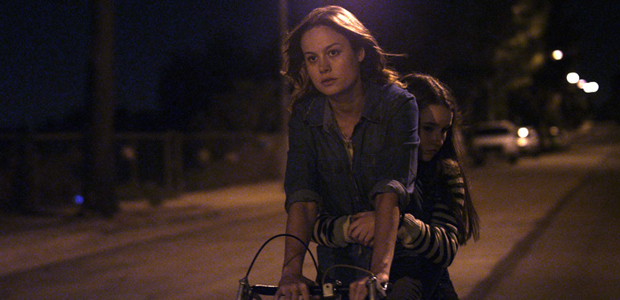
One of the most recent features to hit theaters on this list, Destin Cretton‘s small-scale, intimate drama wears its heart on its sleeve. As we follow Brie Larson (in a stand-out, career-changing performance) and her character’s journey of healing — not only herself, but the group of teenagers with whom she works — the film sounds like it could veer into schmaltzy territory, but it rarely hits a false note. If one wants to experience a film that runs the emotional gamut in a genuinely affecting way, there are a few better features that can accomplish such a feat this year – Jordan R.
Simon Killer (Antonio Campos)
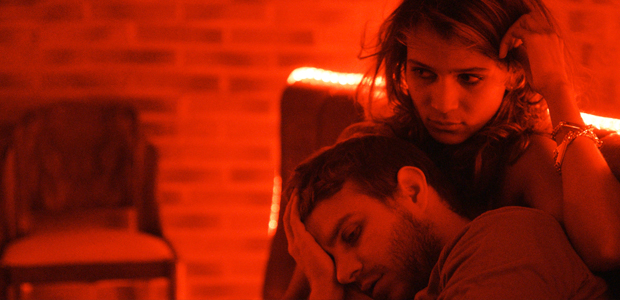
Simon Killer, the sophomore effort from Afterschool director Antonio Campos, continues his series of dark, gripping character studies. Brady Corbet is Simon, a heartbroken, confused college graduate who arrives in Paris with no plans other than to visit art galleries, tourist spots and ponder over a freshly expired five-year relationship. While walking the streets one night, he encounters an easy, feeble solution to his problem, entering a whorehouse. Meeting a prostitute named Victoria (Mati Diop), the two pursue a relationship that extends beyond her work obligations. From here, the downward spiral of poor decisions begin as the layers of Simon’s psyche peel away. We hate him for his actions, yet are captivated by what he’ll do next, thanks to Corbet’s phenomenal performance. This beguiling, vexing follow-up for Campos has divided audiences since it premiered nearly 20 months ago, but I clearly fall on the side of considering it one of the finest films the year has to offer. – Jordan R.
Something in the Air (Olivier Assayas)
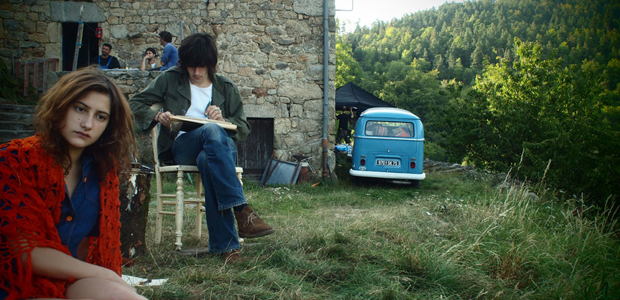
In framing a coming-of-age story around kids with no real revolution to stage — early ’70s French youth hopelessly trying to make up for the “we blew it, man” of May ’68 — Something in the Air realizes the pains of maturing as both grasping those “in the now” emotions seemingly beyond our reach and the memories & standards entrenched in our still-limited past. With the director’s stand-in acting as a handsome cipher, absorbing supposedly radical politics and aesthetic standards — only to end up on the set of a Hollywood B-movie — it would seem that Assayas is critical of his generation, yet, being the sometimes gooey humanist he is, count on your eyes to water during a bittersweet closing few minutes set to Kevin Ayer’s “Decadence.” – Ethan V.
Stories We Tell (Sarah Polley)
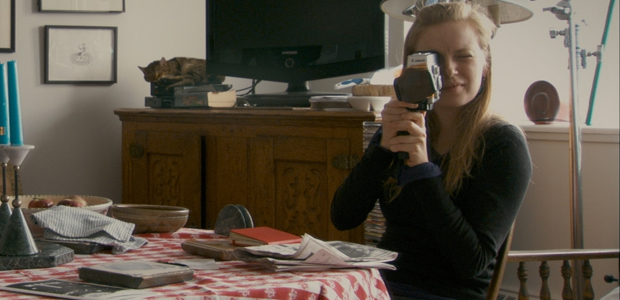
Sarah Polley’s third film as a director is many things, all of them brilliant. It is a moving study of an atypical (to say the least) father-daughter relationship, a detective story, a treatise on the power of family secrecy, and an audacious commentary on “non-fiction” cinema. But above all else, it is a wildly entertaining quasi-soap opera. Watching Polley interview her siblings, share old films and photographs, and, ultimately, discover where she came from, is one of the most insightful cinematic experiences in recent memory. There is a specific moment near the film’s end that leaves the viewer confused, breathless, and exhilarated. That’s the power of Sarah Polley, and Stories We Tell. – Christopher S.
The Spectacular Now (James Ponsoldt)
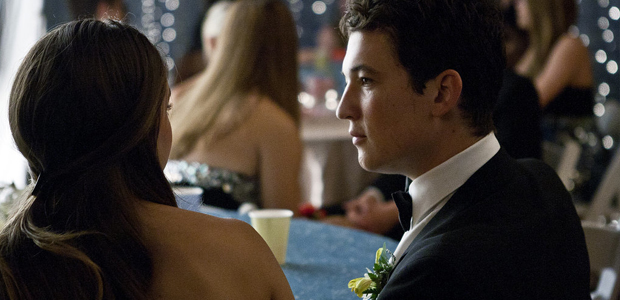
An odd irony of many modern coming-of-age tales is that they often lack maturity. Enter James Ponsoldt’s The Spectacular Now, that has the wisdom to introduce its pair of teens, Sutter Keely and Aimee Finicky, as normal, sensible people who struggle with real issues and talk in furtive, thoughtful ways not limited by their youth. Most refreshing is that Ponsoldt’s direction never overpowers the magnetic chemistry of Miles Teller and Shailene Woodley, who are never less than real kids who are plotting their own precarious course towards a plausible adulthood. Whether it’s the up-and-downs of young love, or Keely’s alcohol issues, there’s a delicate and sure hand applied to the wide-eyed script. Love stories of this earnest breed aren’t made very often. All the more reason to treasure The Spectacular Now. – Nathan B.
To the Wonder (Terrence Malick)
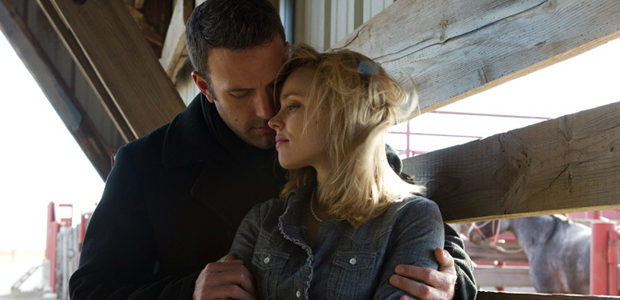
While hyperbolically heralded by its star as making “The Tree of Life look like Transformers,” Terrence Malick’s latest feature instead shocked some by simply being the first of his films to be entirely contemporary. Aside from just St. Vincent’s “Now, Now” inexplicably (but pleasantly) popping in during the still-classical music heavy score, the jolt comes in seeing a Walgreens or high school marching band treated with the Malick touch; “Everything is beautiful here” indeed. Yet it’s not long to last, only revealing itself as only one half of a poverty-stricken small town as well as the backdrop for more romantic and spiritual quandaries. For questions repeatedly asked but never answered, but as evidenced by this new Malick prolifically, they’re at least in sight. – Ethan V.
The World’s End (Edgar Wright)
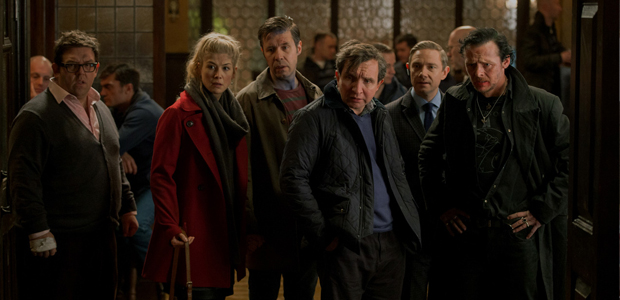
Closing the Three Flavours Cornetto Trilogy (or Blood and Ice Cream Trilogy; designation can vary), Edgar Wright, Simon Pegg, and Nick Frost, now older and wiser, begin to shake themselves free from the nostalgia that drove Shaun of the Dead and Hot Fuzz. But it’s not all doom and gloom, even with that title: utilizing an ensemble also consisting of Paddy Considine, Martin Freeman, Eddie Marsan, and Rosamund Pike (to name only its main players), The World’s End is bitingly funny, to the surprise of few — Wright and Pegg’s screenplay brings with it enough hearty, genuine laughs that, alone, could warrant a place on this list — yet this quality only reemphasizes the unmistakably discomfiting strength of its dramatic center. In daring to end a beloved comedy series on something of a thematic and narrative question mark, the trilogy has established itself as not merely the best its genre can offer, but also among the most well-realized in all of cinema, period. – Nick N.
Upstream Color (Shane Carruth)

It was a long but worthwhile wait for Shane Carruth’s follow-up to the acclaimed sci-fi head-scratcher Primer. What’s impressive about Upstream Color is just how elastic and affecting its charms turn out to be; it’s both more accessible and more esoteric than Primer, and it leaves a stronger emotional impression. Certain to be confounding initially, Color leaves behind the stiff, schematics of Primer for a slice of sci-fi naturalism that looks like the glorious melding of Terrence Malick and Philip K. Dick. Carruth, who tried for years to get the epic sci-fi A Topiary off the ground, has channeled that script’s staggeringly cosmic notions into the more intimate and personal frame of Upstream Color. Sure, it’s got pigs and worms and drug-fueled dream trips, but it’s got heart too. That latter attribute is most apparent in Amy Seimetz’s warm, fragile performance that takes the abstract and gives it empathy. Here’s hoping we don’t wait so long before hearing Carruth’s voice again. – Nathan B.
Una Noche (Lucy Mulloy)

With unparalleled access to the heart of Havana, Cuba, Lucy Malloy’s drama Una Noche portrays the impossible situation of living within a totalitarian regime. Putting the spotlight on three young adults looking for escape—two of which found it in real life after defecting during their Tribeca press tour—we peer into windows and around corners as the underbelly of this civilization is exposed in a web of black market trading and prostitution. A raw, unfiltered account of abuse, poverty, and the slimmest glimmer of hope all shot on location with amateur actors, the film’s dreamers fantasizing about a life beyond closed-borders gradually become one more cautionary tale to prove real life doesn’t always have a happy ending. – Jared M.
You Ain’t Seen Nothin’ Yet (Alain Resnais)
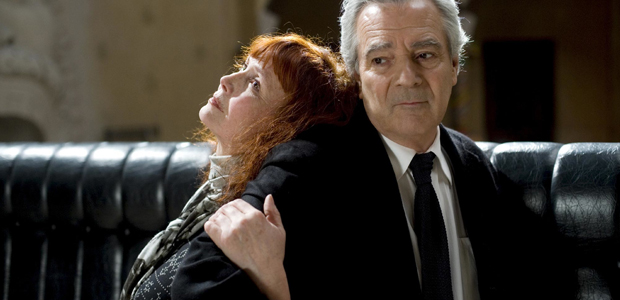
Indulging in a multi-layered composite narrative like so, You Ain’t Seen Nothin’ Yet flows on a mysterious internal logic which can quickly recall the dream mechanics of Resnais’ most well-regarded accomplishment, Last Year at Marienbad; though, as a work more concretely concerned with the act of storytelling, the mysteries residing herein yield a stronger sense of center and resolution. In all truth, they may appeal to one’s personal cinematic concerns more profoundly. Once Resnais has put every last piece into motion, his most remarkable tactic is revealed: level after level of diegetic action opens upon itself, springing forward to consistently renew a sense of its Russian doll structure. – Nick N.
What are you favorite films of the year thus far?

